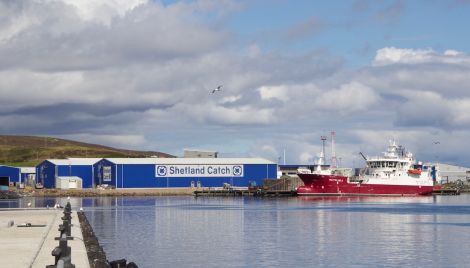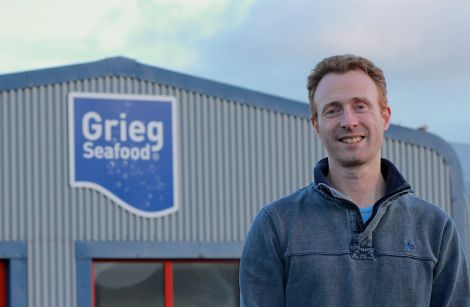News / Mixed views on Brexit among fish processors
SHETLAND’S fish-catching industry may have been among the most vocal cheerleaders for Brexit – but even if escaping the Common Fisheries Policy (CFP) does herald a rosier future for the local fleet, there are those who believe it could pose difficulties for fish processors in the islands.
While a detailed statistical picture specific to Shetland is not available, several sources within the lucrative multimillion pound industry recognise that exiting the EU could make finding workers more challenging for factories.
It is broadly felt that a deal is likely to be struck enabling EU nationals to continue living and working in the UK. But some – such as Grieg Seafood Hjaltland’s managing director Grant Cumming – foresee greater difficulties in recruiting new workers post-Brexit.
‘We would really struggle without EU workers’
More than half of the workers in Grieg Seafood’s processing factory (24 out of 45) are EU citizens, as are several skilled staff in its £16 million hatchery at Girlsta. In total, Grieg has 167 employees and just over a fifth, 35, hail from elsewhere in the EU.
“It is a concern. We would really struggle without our EU workers,” he told Shetland News. “There’s a number of important and valuable processing jobs held by them, and a number of skilled positions too – there are a lot of EU graduates working for us too. Our vet is from Poland, a large number of our staff at the hatchery – which is obviously highly skilled work – are EU nationals as well.
“There is certainly a feeling among some of them that the uncertainty makes this a less attractive place to stay. There’s no question that across the country we have lost a lot of people back to the EU, not so much in Shetland, but it could come.
Become a member of Shetland News
“My gut feeling is they will probably be allowed to remain, the people that we’ve got working here, but it may be much more difficult in the future recruiting.
“On the farming side it’s largely locals, but particularly the hatchery and factory, it’s very difficult to find local people to take the job.”
But Pelagia Shetland chief executive Egil Magne Haugstad, whose Norway-based company recently took over Shetland Catch’s processing factory at Gremista, views Brexit more as an opportunity than a threat.
Pelagia chief upbeat about post-Brexit prospects
After recent changes to the business, Pelagia “only have Shetland workers normally and on [a] fixed basis, but now during peak production including filleting, we have 10 workers who I believe are from other EU countries”.
He said Brexit was a “huge opportunity” for the fishing industry and “all challenges connected to production and market can and will be solved after that”.
On the employment front, Haugstad said the key would be ensuring good pay and working conditions to make jobs attractive to would-be employees.
“I don’t think one should be worried about access of workers after Brexit,” he said. “If the industry can pay competitive salary there is a huge amount of people seeking work inside and outside EU. It will all be up to politicians in [the] UK to decide which nationality [is] being allowed to work there.
“Additionally what rationality should be in EU to deny workers from, let’s say, Baltic countries not to go to UK to work as an alternative to being unemployed at home? We have enough real problems. Let’s not create problems.”
Ruth Henderson of Seafood Shetland said she had requested statistics from member companies on the proportion of EU workers. She is “waiting for feedback” from them and did not wish to comment on the issue at present.
Sandison hopeful of favourable trade deal
Shetland Aquaculture general manager Davie Sandison said he would expect the proportion of EU workers in fish processing jobs to possibly exceed the UK-wide 38 per cent figure.
Depending on what sort of post-Brexit trade and migration deals the UK is able to reach, he says there could be “a challenge” ahead for employers in the sector.
“If we see a wholesale restriction on, let’s say, new EU migration – because I think there’s indication that [there will be] a deal on existing EU nationals – what’s happening after we leave, that’s the bit that’s still completely up in the air.
“Let’s have some clarity about what the trading arrangements are going to be, movement of labour, goods and so on will be…”
Even with relatively straightforward access to the eastern European workforce, isles-based employers don’t find recruitment easy at times, Sandison said: “We would have to actively campaign for people to come to this island to work. It’s not as if you’ve got a whole pile of people who’ve been displaced, somebody’s nicked their job – it’s not like that at all.
“As an industry, it’s going to be challenging until we know what the rules are, but we don’t see it as something, from a trade point of view, that’s going to be detrimental.
“If we’re able to retain a lot of the good people and they’re still working for aquaculture companies, that’s brilliant. We’ve got a really good workforce from all over the place – a lot of non-EU nationals as well.”
SNP & Lib Dem MSPs voice employment fears
In the political arena, opinions are mixed, too. Shetland MSP Tavish Scott said simply that “like many industries across the whole country, fish processing needs skilled workers, many of whom are from different parts of Europe”.
“The UK Government must recognise this reality and make sure that this essential industry can continue to employ men and women no matter where they originate,” the Liberal Democrat said.
“People may have voted to leave the EU but they did not vote for a mad immigration policy that could put the fish processing industry’s future in jeopardy.”
SNP Highlands and Islands list MSP Maree Todd said she had heard “anecdotally” that it is “nearer 50 per cent of the employees of Shetland’s processors” that come from other EU countries and “there is obviously a concern because of the very low rate of unemployment here”.
She said industry figures in Orkney, the Highlands and Aberdeenshire had been speaking up about their fears.
While she does not think EU nationals will ultimately be forced to leave, she does fear “some will choose to go because they feel less welcome and the pound is worth less now. More worrying is how difficult it will be to attract them in future.”
Conservative list MSP Jamie Halcro-Johnston, who stepped into the role earlier this summer, highlighted how his party’s Scottish leader Ruth Davidson’s rhetoric on immigration struck a different tone compared to many Tories south of the border.
He is confident the eventual Brexit deal will still enable the UK to attract migrant workers.
“Brexit doesn’t stop people moving to this country to work, it just means we control that,” Halcro-Johnston said. “Brexit negotiations are ongoing at the moment, but I have no doubt that the ability to provide workers for key sectors in the economy is going to be one that’s very important.”
Become a member of Shetland News
Shetland News is asking its many readers to consider paying for membership to get additional features and services: -
- Remove non-local ads;
- Bookmark posts to read later;
- Exclusive curated weekly newsletter;
- Hide membership messages;
- Comments open for discussion.
If you appreciate what we do and feel strongly about impartial local journalism, then please become a member of Shetland News by either making a single payment, or setting up a monthly, quarterly or yearly subscription.






























































